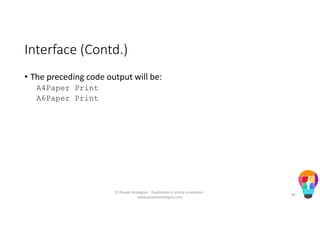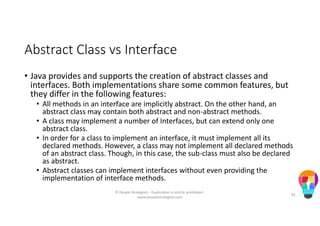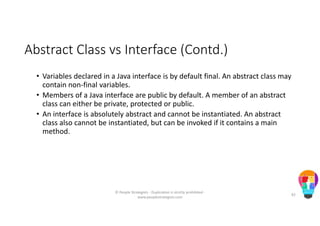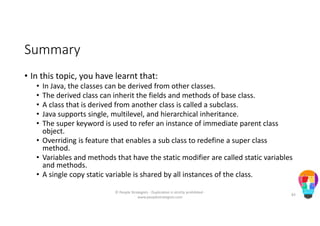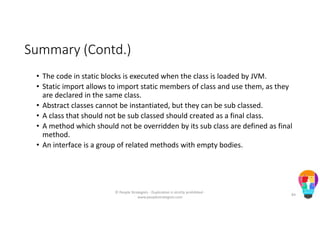This document discusses inheritance in Java. It defines inheritance and the different types including single, multilevel, and hierarchical inheritance. It provides examples of each type of inheritance using classes like Base, Sub, Circle, and Cylinder. It also discusses using the super keyword to refer to parent classes and overriding methods in subclasses.
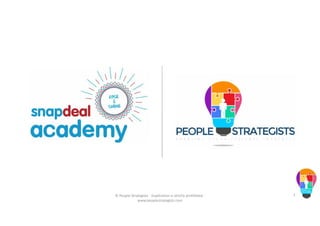
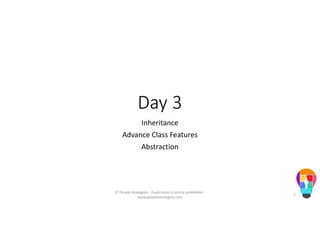

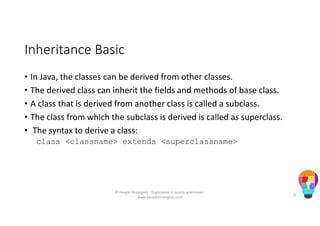
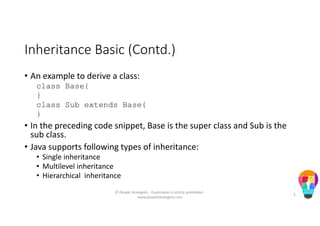
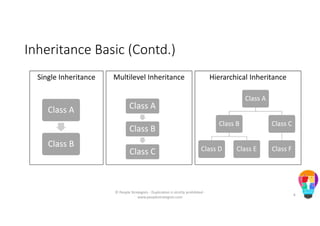
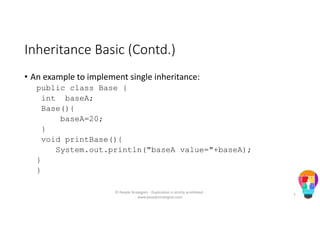
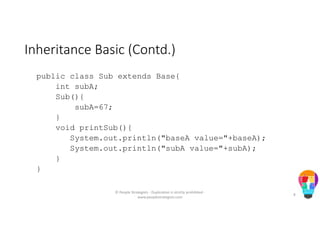
![Inheritance Basic (Contd.)
public class InheritanceDemo {
public static void main(String args[]){
Sub obj=new Sub();
obj.printSub();
obj.printBase();
}
}
• The preceding code output will be:
baseA value=20
subA value=67
baseA value=20
© People Strategists - Duplication is strictly prohibited -
www.peoplestrategists.com
9](https://image.slidesharecdn.com/javaday3-150710043731-lva1-app6892/85/Java-Day-3-9-320.jpg)
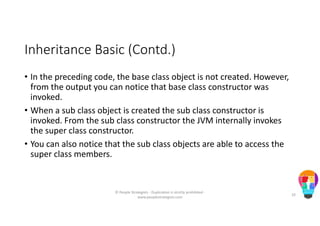
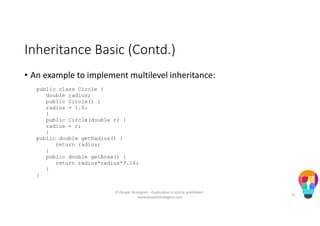
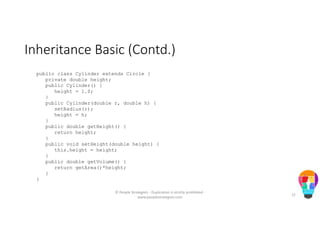
![Inheritance Basic (Contd.)
public class InheritanceDemo {
public static void main(String args[]){
Cylinder cy1 = new Cylinder();
System.out.println("Radius is " + cy1.getRadius()
+ " Height is " + cy1.getHeight()
+ " Base area is " + cy1.getArea()
+ " Volume is " + cy1.getVolume());
Cylinder cy2 = new Cylinder(5.0, 2.0);
System.out.println("Radius is " + cy2.getRadius()
+ " Height is " + cy2.getHeight()
+ " Base area is " + cy2.getArea()
+ " Volume is " + cy2.getVolume());
}
}
© People Strategists - Duplication is strictly prohibited -
www.peoplestrategists.com
13](https://image.slidesharecdn.com/javaday3-150710043731-lva1-app6892/85/Java-Day-3-13-320.jpg)
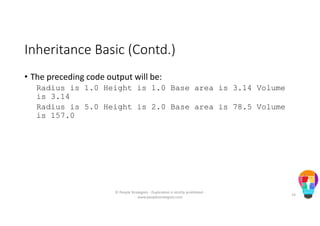
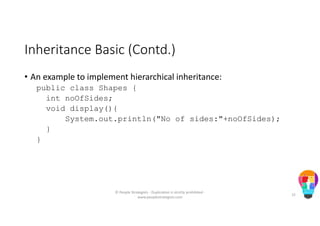
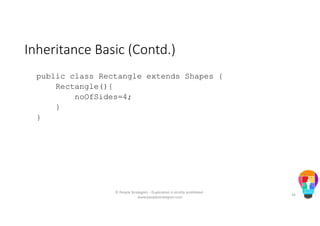
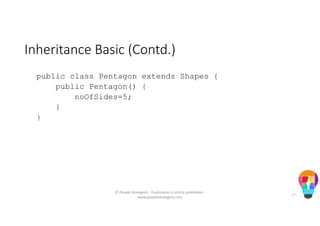
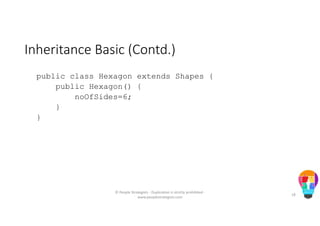
![Inheritance Basic (Contd.)
public class InheritanceDemo {
public static void main(String args[]){
Shapes sObj=new Shapes();
Rectangle rObj =new Rectangle();
Pentagon pObj=new Pentagon();
Hexagon hObj=new Hexagon();
sObj.display();
rObj.display();
pObj.display();
hObj.display();
}
}
© People Strategists - Duplication is strictly prohibited -
www.peoplestrategists.com
19](https://image.slidesharecdn.com/javaday3-150710043731-lva1-app6892/85/Java-Day-3-19-320.jpg)
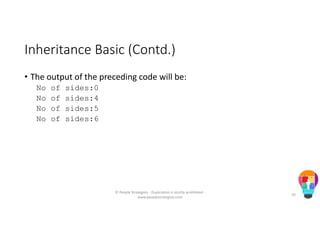
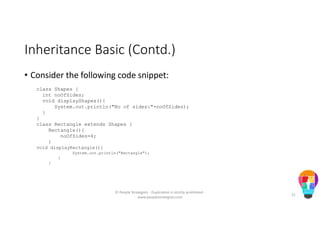
![Inheritance Basic (Contd.)
public class InheritanceDemo {
public static void main(String args[]){
Shapes sObj=new Rectangle();
sObj.displayShapes();
}
}
• In the preceding code, the reference variable sObj, refers to the
object of Rectangle class. Therefore, the
sObj.displayShapes();statement will raise a compilation
error.
© People Strategists - Duplication is strictly prohibited -
www.peoplestrategists.com
22](https://image.slidesharecdn.com/javaday3-150710043731-lva1-app6892/85/Java-Day-3-22-320.jpg)
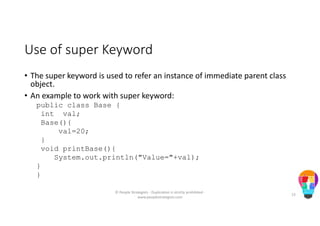
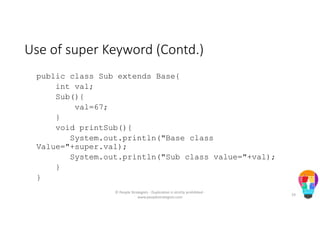
![Use of super Keyword (Contd.)
public class InheritanceDemo {
public static void main(String args[]){
Sub sObj=new Sub();
sObj.printBase();
sObj.printSub();
}
}
• The preceding code output will be:
Value=20
Base class Value=20
Sub class value=67
© People Strategists - Duplication is strictly prohibited -
www.peoplestrategists.com
25](https://image.slidesharecdn.com/javaday3-150710043731-lva1-app6892/85/Java-Day-3-25-320.jpg)
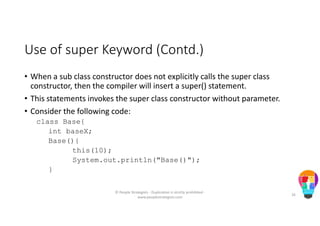
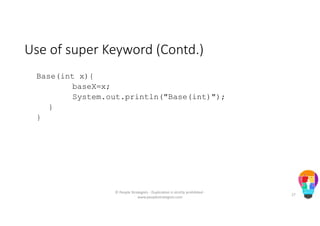
![Use of super Keyword (Contd.)
class Sub extends Base{
int subX;
Sub(){
subX=20;
System.out.println("Sub()");
}
}
public class SuperDemo {
public static void main(String args[]){
Sub sObj=new Sub();
}
}
© People Strategists - Duplication is strictly prohibited -
www.peoplestrategists.com
28](https://image.slidesharecdn.com/javaday3-150710043731-lva1-app6892/85/Java-Day-3-28-320.jpg)
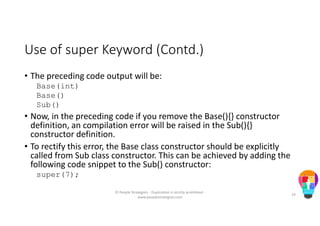
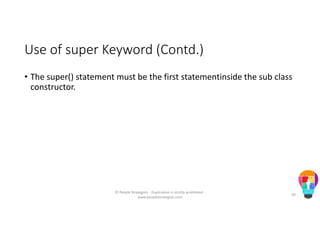
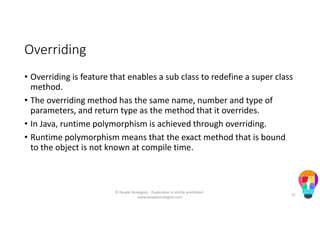
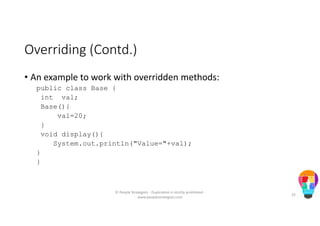
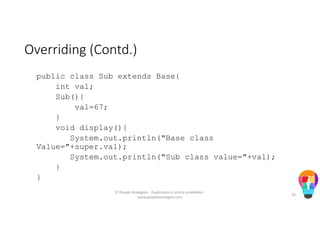
![Overriding (Contd.)
public class InheritanceDemo {
public static void main(String args[]){
Base bObj=new Base();
Sub sObj=new Sub();
bObj.display();
sObj.display();
}
• The preceding code output will be:
Value=20
Base class Value=20
Sub class value=67
© People Strategists - Duplication is strictly prohibited -
www.peoplestrategists.com
34](https://image.slidesharecdn.com/javaday3-150710043731-lva1-app6892/85/Java-Day-3-34-320.jpg)
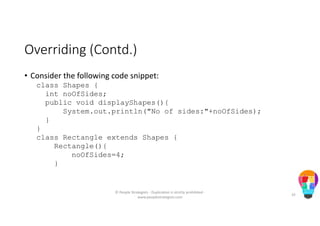
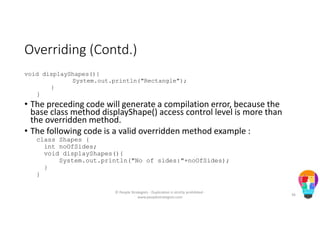
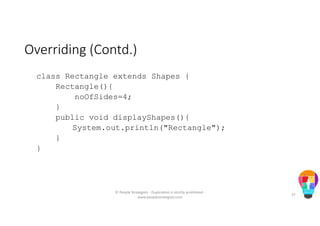
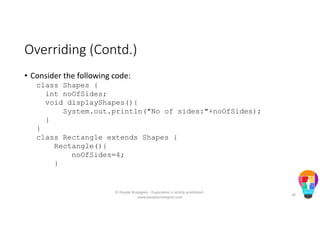
![Overriding (Contd.)
void displayShapes(){
System.out.println("Rectangle");
}
}
public class InheritanceDemo {
public static void main(String args[]){
Shapes sObj=new Rectangle();
sObj.displayShapes();
}
}
© People Strategists - Duplication is strictly prohibited -
www.peoplestrategists.com
39](https://image.slidesharecdn.com/javaday3-150710043731-lva1-app6892/85/Java-Day-3-39-320.jpg)
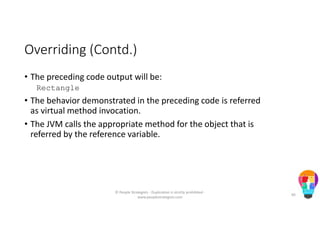

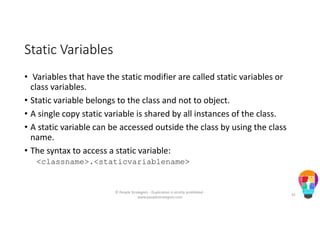
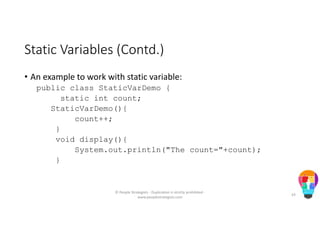
![Static Variables (Contd.)
public static void main(String args[]){
StaticVarDemo obj1=new StaticVarDemo();
obj1.display();
StaticVarDemo obj2=new StaticVarDemo();
obj2.display();
obj1.display();
}
}
• The preceding code output will be:
The count=1
The count=2
The count=2
© People Strategists - Duplication is strictly prohibited -
www.peoplestrategists.com
44](https://image.slidesharecdn.com/javaday3-150710043731-lva1-app6892/85/Java-Day-3-44-320.jpg)
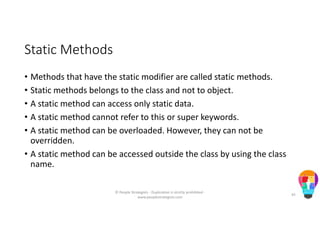
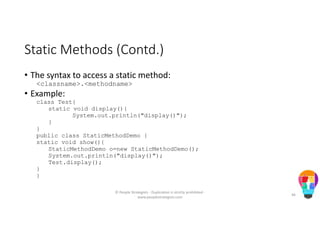
![Static Methods (Contd.)
• An example of to work static method:
public class StaticMethodDemo {
static void display(){
System.out.println("Static display method");
}
public static void main(String args[]) {
display();
}
}
• The preceding code output will be:
Static display method
© People Strategists - Duplication is strictly prohibited -
www.peoplestrategists.com
47](https://image.slidesharecdn.com/javaday3-150710043731-lva1-app6892/85/Java-Day-3-47-320.jpg)
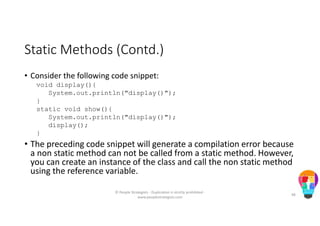
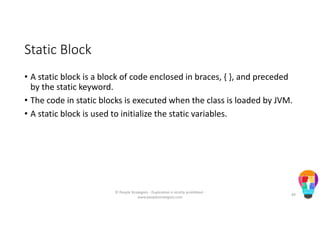
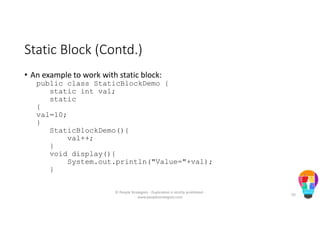
![Static Block (Contd.)
public static void main(String args[]){
StaticBlockDemo obj=new StaticBlockDemo();
obj.display();
}
}
• The preceding code output will be:
Value=11
© People Strategists - Duplication is strictly prohibited -
www.peoplestrategists.com
51](https://image.slidesharecdn.com/javaday3-150710043731-lva1-app6892/85/Java-Day-3-51-320.jpg)

![Static Import (Contd.)
• An example to work with static import:
import static java.lang.Math.*;
public class StaticImportDemo {
public static void main(String args[]) {
double circleArea=PI*pow(4, 2);
System.out.println("Area of
circle:"+circleArea);
}
}
• The preceding code output will be:
Area of circle:50.26548245743669
© People Strategists - Duplication is strictly prohibited -
www.peoplestrategists.com
53](https://image.slidesharecdn.com/javaday3-150710043731-lva1-app6892/85/Java-Day-3-53-320.jpg)

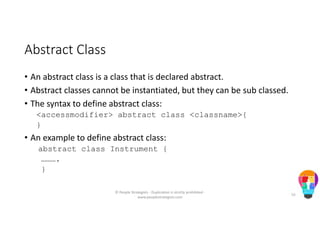
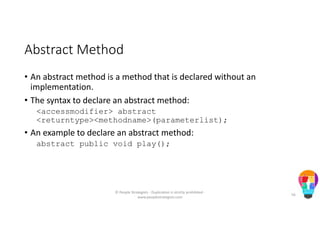
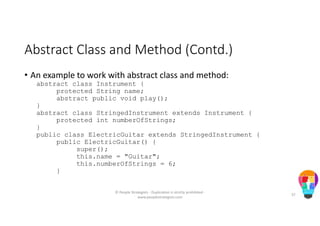
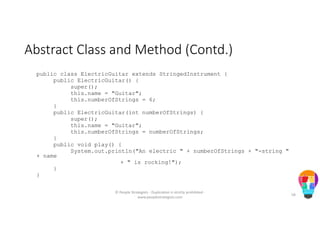
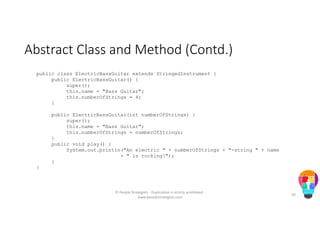
![Abstract Class and Method (Contd.)
public class Execution {
public static void main(String[] args) {
ElectricGuitar guitar = new ElectricGuitar();
ElectricBassGuitar bassGuitar = new ElectricBassGuitar();
guitar.play();
bassGuitar.play();
guitar = new ElectricGuitar(7);
bassGuitar = new ElectricBassGuitar(5);
guitar.play();
bassGuitar.play();
}
}
© People Strategists - Duplication is strictly prohibited -
www.peoplestrategists.com
60](https://image.slidesharecdn.com/javaday3-150710043731-lva1-app6892/85/Java-Day-3-60-320.jpg)
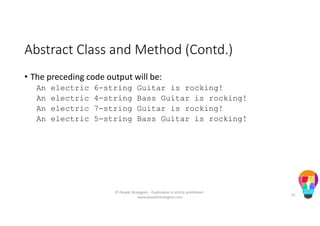
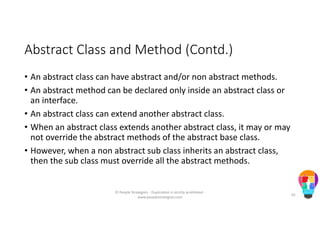
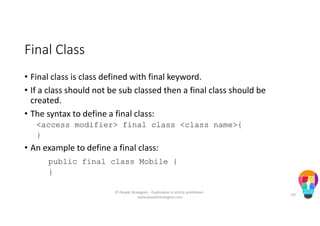
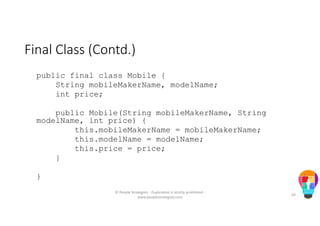
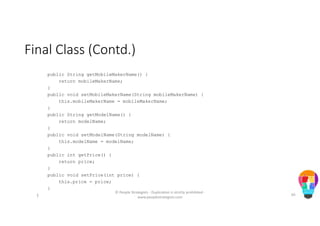
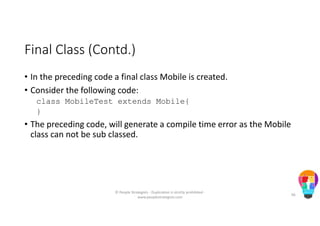
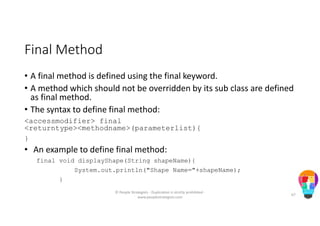
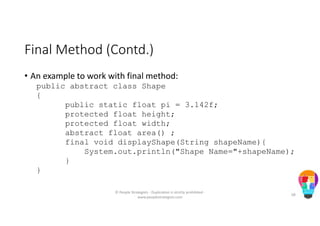
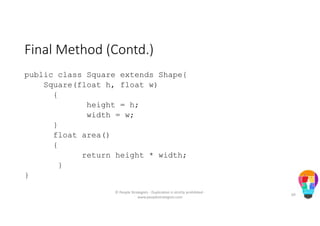
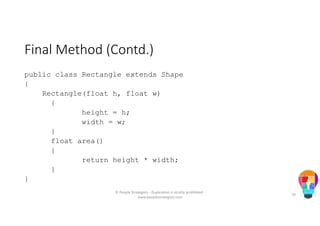
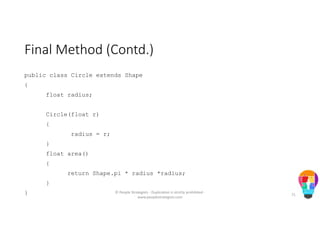
![Final Method (Contd.)
class FinalMethodDemo
{
public static void main(String args[])
{
Square sObj = new Square(5,5);
Rectangle rObj = new Rectangle(5,7);
Circle cObj = new Circle(2);
sObj.displayShape("Square");
System.out.println("Area: " + sObj.area());
rObj.displayShape("Rectangle");
System.out.println("Area: " + rObj.area());
rObj.displayShape("Circle");
System.out.println("Area: " + cObj.area());
}
}
© People Strategists - Duplication is strictly prohibited -
www.peoplestrategists.com
72](https://image.slidesharecdn.com/javaday3-150710043731-lva1-app6892/85/Java-Day-3-72-320.jpg)
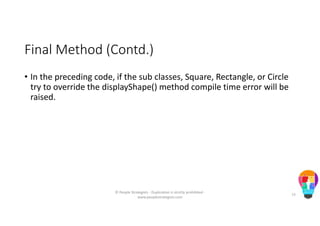
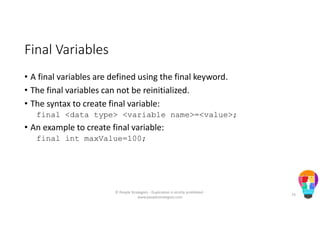
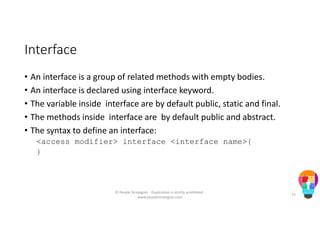
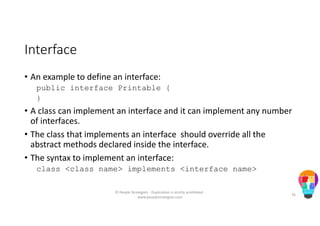
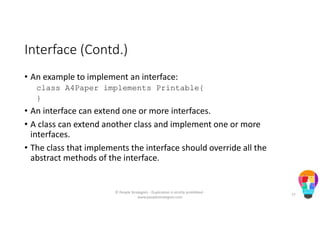
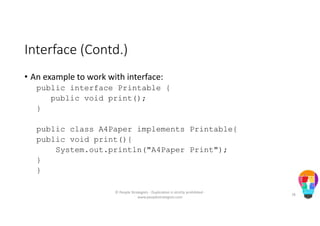
![Interface (Contd.)
public class A6Paper implements Printable{
public void print(){
System.out.println("A6Paper Print");
}
}
public class InterfaceDemo {
public static void main(String args[]){
A4Paper obj1=new A4Paper();
A6Paper obj2=new A6Paper();
obj1.print();
obj2.print();
}
}
© People Strategists - Duplication is strictly prohibited -
www.peoplestrategists.com
79](https://image.slidesharecdn.com/javaday3-150710043731-lva1-app6892/85/Java-Day-3-79-320.jpg)
